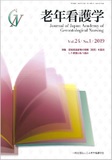Japanese
English
- 販売していません
- Abstract 文献概要
- 参考文献 Reference
抄録
高齢者の「予想される死」の援助場面における「呼吸停止確認」の現状について訪問看護師に郵送質問紙調査を実施し,122人から回答を得た.
医師不在時に「呼吸停止確認」をしている訪問看護師は69人,していない訪問看護師は53人であった.看護師による「呼吸停止確認」に「賛成である」と考えている人は40人(32.8%)であり,「呼吸停止確認」をしていないが「すべきと考える」3人(2.5%)と「条件が整えば実施してよいと考える」の33人(27.0%)を合わせると,約6割の看護師が看護師による「呼吸停止確認」について肯定的にとらえていた.また,認定・専門看護師は有意に「呼吸停止確認」を肯定的にとらえていた.看護師は,医師の到着時間が遅いという現状のなかで,高齢者および家族のよりよい看取りを尊重するために「呼吸停止確認」を行っていた.
近年,看護師の医行為が急激に拡大しつつある現状のなかで,改めてケアとキュアの統合の推進の必要性が明らかになった.
After sending a questionnaire to visiting nurses inquiring about the current status of “respiratory arrest confirmation” at an aid scene for elderly persons facing “expected death,” we obtained responses from 122 nurses.
Of those 122 nurses, 69 had confirmed respiratory arrest in the absence of a doctor; 53 had not. Among them different responses were received: 40 (32.8%) reported that they “advocate respiratory arrest confirmation” by a nurse; 3 (2.5%) responded that “think that they should confirm it,” even if they had never experienced “respiratory arrest confirmation”; 33 (27.0%) answered that they “think that they might do it if conditions are right.” Total percentages of respondents suggest that about six of ten positively accept “respiratory arrest confirmation” by a nurse. Additionally, certified nurses and nurse specialists significantly regarded “respiratory arrest confirmation” positively. Results revealed that the nurses had conducted “respiratory arrest confirmation” to provide better care for elderly persons facing death and for their families in spite of circumstances under which a doctor is likely to be late arriving.
In recent years, as medical practice by nurses has increased rapidly, integration between care and cure must be implemented.
Copyright © 2019, Japan Academy of Gerontological Nursing All rights reserved.


